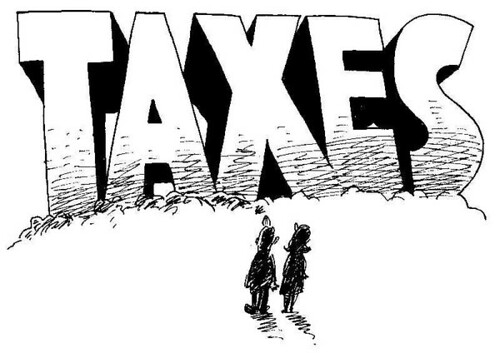Sin #1: Deducting the wrong year for property taxes
You take a tax deduction for property taxes in the year you (or the holder of your escrow account) actually paid them. Some taxing authorities work a year behind — that is, you’re not billed for 2013 property taxes until 2014. But that’s irrelevant to the feds.
Enter on your federal forms whatever amount you actually paid in 2013, no matter what the date is on your tax bill. Dave Hampton, CPA, tax manager at the Cincinnati accounting firm of Burke& Schindler, has seen home owners confuse payments for different years and claim the incorrect amount.
Sin #2: Confusing escrow amount for actual taxes paid
If your lender escrows funds to pay your property taxes, don’t just deduct the amount escrowed, says Bob Meighan, CPA and vice president at TurboTax in San Diego. The regular amount you pay into your escrow account each month to cover property taxes is probably a little more or a little less than your property tax bill. Your lender will adjust the amount every year or so to realign the two.
For example, your tax bill might be $1,200, but your lender may have collected $1,100 or $1,300 in escrow over the year. Deduct only $1,200. Your lender will send you an official statement listing the actual taxes paid. Use that. Don’t just add up 12 months of escrow property tax payments.
Sin #3: Deducting points paid to refinance
Deduct points you paid your lender to secure your mortgage in full for the year you bought your home. However, when you refinance, says Meighan, you must deduct points over the life of your new loan. If you paid $2,000 in points to refinance into a 15-year mortgage, your tax deduction is $133 per year.
Sin #4: Misjudging the home office tax deduction
This deduction may not be as good as it seems. It’s complicated, often doesn’t amount to much of a deduction, has to be recaptured if you turn a profit when you sell your home, and can pique the IRS’s interest in your return. Hampton’s advice: Claim it only if it’s worth those drawbacks. If so, here’s what to know about what you can write off.
Sin #5: Failing to repay the first-time home buyer tax credit
If you used the original home buyer tax credit in 2008, you must repay 1/15th of the credit over 15 years. If you used the tax credit in 2009, 2010, or 2011 and then sold your house or stopped using it as your primary residence, within 36 months of the purchase date, you also have to pay back the credit.
The IRS has a tool you can use to help figure out what you owe.
Sin #6: Failing to track home-related expenses
If the IRS comes a-knockin’, don’t be scrambling to compile your records. Many people forget to track home office and home maintenance and repair expenses, says Meighan. File away documents as you go. For example, save each manufacturer’s certification statement for energy tax credits and lender stamtements to confirm property taxes paid.
Sin #7: Forgetting to keep track of capital gains
If you sold your main home last year, don’t forget to pay capital gains taxes on any profit. You can exclude $250,000 (or $500,000 if you’re a married couple) of any profits from taxes. So if you bought a home for $100,000 and sold it for $400,000, your capital gains are $300,000. If you’re single, you owe taxes on $50,000 of gains. However, there are minimum time limits for holding property to take advantage of the exclusions, and other details. Consult IRS Publication 523.
Sin #8: Filing incorrectly for energy tax credits
If you made any eligible improvements in 2012 — or will in 2013 — such as installing energy-efficient windows and doors, you may be able to take a 10% tax credit (up to $500). But keep in mind, it’s a lifetime credit. If you claimed the credit in any recent years, you’re done. Fill out Form 5695.
Part II of the form, which covers systems eligible for a larger tax credit through 2016, such as geothermal heat pumps, can be incredibly complex and involves crosschecking with half a dozen other IRS forms. Read the instructions carefully.
Sin #9: Claiming too much for the mortgage interest tax deduction
You can deduct mortgage interest only up to $1 million of mortgage debt, says Meighan. If you have $1.2 million in mortgage debt, for example, deduct only the mortgage interest attributable to the first $1 million.
...............................................................................................
visit my entire blog at http://blogs.har.com/cynthiamullins
Client Experience Rating: http://goo.gl/bCoMo
email cynthia@cynthiamullins.com
follow me at www.twitter.com/cynthiamullins
friend me at www.facebook.com/cynthiamullins1
see what people like about the Heights and what they think is its best kept secret at www.youtube.com/cynthiamullins
houston condominiums, houston highrises, houston home builders, houston home prices, houston home rentals, houston home value, houston homes, houston homes for rent, houston homes for sale, houston house, houston house value, houston houses, houston housing, houston listings, houston MLS, houston neighborhoods, houston new homes, houston properties, houston property, houston real estate, houston real estate agents, houston real estate associates, houston real estate brokers, houston real estate companies, houston real estate firms, houston real estate information, houston real estate listings, houston real estate market, houston real estate schools, houston real estate service providers, houston real estate solds, houston real estate values, houston realestate, houston realtors, houston relocation, houston schools, houston single family homes, houston sold home prices, houston sold homes, houston subdivisions, houston town homes, houston heights real estate housing market homes for sale buying selling inner loop properties houston texas tx OPEN Houses 1545 Heights Boulevard, Houston, TX 77008 77007 77009 houston heights realtor Woodland Heights Norhill Sunset Heights HISD Hogg Middle School IB Program Harvard Elementary Hamilton Middle School Reagan High School




